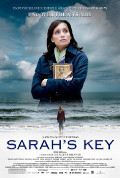
France 2010
Directed by
Gilles Paquet-Brenner
111 minutes
Rated M
Reviewed by
Bernard Hemingway

Sarah's Key
Synopsis: A modern day American journalist (Kristin Scott Thomas) living in Paris discovers her family's involvement in an infamous Vichy roundup and imprisonment of Jews during World War 2.There will be people who will be won over by Sarah's Key. There will also be those who find it a near teeth-grinding visit to the over-familiar. I happen to belong to the latter group. There's no denying the value of the film's exposé of a shameful and little-known incident in France's history - the wholesale round-up in Paris on July 16, 1942 of Jewish families, their confinement in the Vélodrome D'Hiver sports stadium and their deportation to concentration camps and, in many cases, their deaths. (Coincidentally the event has already been covered by Roselyne Bosch's La Rafle, a film which has not been released here but which was a big hit in France earlier this year). The downside of Gilles Paquet-Brenner's treatment of this subject-matter is that stylistically it is so neatly and generically art-house that much of the story's potential impact is undermined.
Based on a best-selling novel by Tatiana de Rosnay, Sarah's Key alternates between two story lines which eventually merge. In the first, Sarah (Melusine Mayance), a 10-year-old Jewish girl, tries to save her younger brother by locking him in a secret cupboard just before Vichy police arrest her and her parents. In the parallel strand, journalist Julia Jarmond (Scott Thomas), who is writing a piece on the event, discovers that her in-laws acquired the apartment that Sarah lived in and that her architect husband (Frederic Pierrot) who has inherited it, is renovating it for them. Wracked by guilt, Julia becomes obsessed by trying to find out what became of Sarah.
I imagine that in the more open-ended form of the novel this coincidence that sets the narrative on its course seemed less of a convenience than it does here. Indeed much of the film's plot depends on similarly glib continguities as Julia pursues her quarry from Paris to New York to Florence, the story seamless progressing to its predictable conclusion. This sort of thing is the standard stuff of thrillers but is less appropriate in what wants to be taken for real-life drama. Indeed when, late in the film, the indefatigable Julia sets out to find Sarah's adult son who lives in Florence, the globe-trotting sleuthing becomes a tad too much to swallow.
The core problems with Paquet-Brenner's film, however, is that, unlike us, Julia is not seeing Sarah's story, which is presented as a kind of schematic recreation. At least initially she does not even know of her own connection to it. As the film never explains Julia's obsessional identification with the victimized Sarah (a frustrated maternal instinct perhaps?), her quest seems too much of a contrivance. Whether intentionally or not Paquet-Brenner glosses over these deeper issues with polished production values and a photogenic cast . If his directorial style, with its many dolly and crane shots is very much in the classical art-house manner, the script penned by Paquet-Brenner with Serge Joncour is sometimes heavy-handed, labouring its points and by the last two scenes, in which Sarah's middle-aged son (Aidan Quinn) confronts his past, approaching the unintentionally fatuous.
Despite its title, Paquet-Brenner's film is really about Julia. However because we are never given any insight into the whys and wherefores of Julia's character and her marriage dissolves without a whimper, Scott Thomas is not called on to do anything more than to be elegantly and dispassionately determined, something which, having played it so many times before, she can no doubt turn on and off like tap water. And that is pretty much the impression she gives here. Professional but uninvolved, not to mention over made-up to disguise the fact that at 50 she is rather too old for the part. If not exactly sentimental, Sarah's Key is well crafted but feels overly cinematized. One hopes that Rose Bosch's film will get a release here so that we can at least witness a different and, hopefully, grittier take on the Vél D'Hiv story.

Want more about this film?


Want something different?




